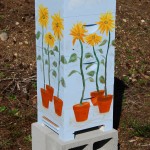CCD or Colony Collapse Disorder seems to be a title that man has put on a multifaceted problem. Of course this fits nicely with our overall need to seek “the one thing”. The one pill that will make us thin, the one idea that will make us rich, the one secret to living a fulfilled life, the one exercise that will melt away love handles.
The more reading I do and the more people I talk with leads me to believe that CCD is not one ailment but rather a series of deficiencies that lead up to the demise of what was thought to be a healthy bee colony.
Though I’m not a scientist, nor do I have a laboratory in my basement…that would be cool though, I can sift through lots of data that others have collected and make sense of it. See the logic (at least my logic) and draw some conclusions.
While reading this last issue of American Bee Journal I came across an article that made sense to me. The article by Peter Loring Borst speaks to a bees diet and covers a lot of great information about pollen and its food value. But one part jumped out at me specifically.
Two groups of bees were analyzed. One that was on a monofloral diet (one crop of plants, one primary source of pollen like huge fields of soy, or large groves of almonds) and bees who were eating a polyfloral diet (variety of plants around the hive, no one predominant pollen source). Both diets produced what the bees needed to be healthy and active in this life cycle….however bees that were on the monofloyral or restricted diet produced a smaller amount of an enzyme called glucose oxidase (GOX).
Glucose oxidase is an enzyme that converts sucrose into an antiseptic that we are all familiar with called hydrogen peroxide. The hydrogen peroxide is used by the bees in honey and larval food production to help reduce the growth of bacteria and pathogens. So, while the bees on a monofloral diet that are currently flying might be healthy, the next generation of bees may well have a weakened immune system due to being fed food with higher levels of bacteria.
The bees on the polyfloral, or balanced diet, on the other hand, produced greater levels of GOX, which would provide for food with lower levels of bacteria or pathogens thus producing new offspring with normal immune systems.
While there are many other factors out there that lead to the loss of a colony; weather, pesticides, pests, starvation and the beekeeper, providing a balanced source of pollen and nectar for your bees will give them the strength to deal with all the other threats against them.
Those of us that are into back yard beehives may well have the best chance of providing for a balanced diet for our bees. Just look around your neighborhood and I’m sure you will see lots of variety.

